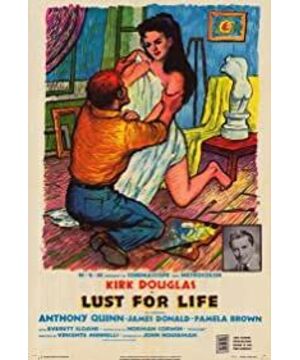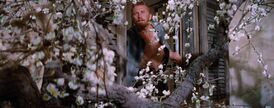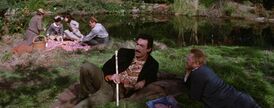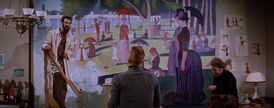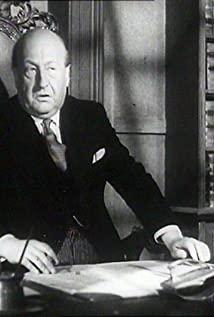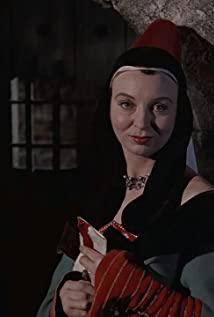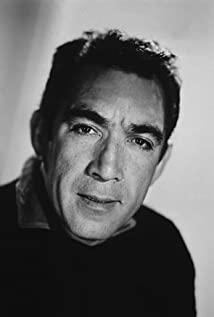The film "Longing for Life" was adapted from the biography of the same name written by the great American biographer Owen Stone for the painter Van Gogh. It was filmed in Hollywood in 1956 and starred Kirk Douglas. Douglas vividly expresses a hesitant, lonely, enthusiastic, persistent, tender, struggling, painful, split, with a rich emotional level "he".
His sermons were always incomprehensible, and he tried to live like a true Christian, not a hypocrite like other missionaries. In the mining area, he preached in the mine shaft below 500 meters, gave up the bed to women and children, and cried like a child after being questioned and angry by others. He said he was trapped in a cage of shame, self-doubt, and loneliness.
He was regarded as an outlier in his hometown, and he felt that nature moved him. He picked up a clumsy brush and hoped to paint men and women at work and capture the beauty of nature. He was full of enthusiasm and just wanted to create something that would make people feel the same Deep and delicate painting.
He is stubborn and lacks reason, and he believes that when a person has love, he has a life. A strong sense of loneliness breeds a strong desire for love. No normal person can accept his fanaticism. At the moment when he just wanted to meet his cousin and couldn't to avoid his cousin, he put his hand on the candle and burned it, others had already equated him with a lunatic.
In The Hague, he studied painting in poverty, and finally left the woman who loved him but could not tolerate poverty, and gave up the so-called orthodox techniques of painting plaster statues. In his heart, depicting the beauty and depth of the Dutch fields is the whole meaning of creation.
He went to Paris, where the artists gathered, he saw the works of Cezanne, Gauguin, Monet, Seurat, Pissarro, accepted the ideas of Impressionism, and the color elements of Japanese Ukiyo-e, but he was still So out of place, even so passionate about painting. He is a person who fights with himself. Although he is talented, the world sees more of his eccentricities and does not see the warmth in his heart. Therefore, every step forward, he finds more loneliness.
He was in Provence, and after carrying a picture frame, he was displaced, and finally found an old house with a monthly rent of 15 francs, and he did his best work. He jumped in the countryside, enjoying the joy of color in the fields of golden yellow, bronze and dark green, and he made the canvas burn with greater breadth and strength.
He was lonely, so he longed for friendship, and his friend Gauguin came to accompany him, which made him ecstatic. He arranged the room for Gauguin, and in the room hung the group of paintings of golden sunflowers like the sun. But Gauguin's life is abstract and full of logic and sense of order. His confusion, and his philosophies, kept them bickering. He did not allow Gauguin to criticize Miller, and his attack on Degas caused Gauguin to leave in anger. His pleading, considered by the other side to be sentimental, finally lost his friendship and his loneliness came back. In front of the mirror, he was in pain, distortion, sadness, and fear. He cut off one ear and mutilated himself.
He believed that he was a threat to others and himself. In 1889, he volunteered to be admitted to a mental hospital. In the closed space, he was dull and fearful. Only painting is his soul, but the excessive emotion poured into painting makes him never calm.
Returning to society, living in the countryside far from the city, he met Dr. Gachet, a man who knew and praised his courageous, passionate artist temperament. He felt stable about himself and worked as hard as a miner in a disaster. He finally had good news. A female painter in Brussels bought his painting for 400 francs, which was the first successful sale in his life. He was on the verge of becoming famous, because he was occasionally talked about in some art salons. But he had another seizure, feeling utterly hopeless and seeing no way out, he was insane, he finished painting the crow on the wheat field, ran wildly under the dead tree in the field, pulled out his revolver and committed suicide.
On the hospital bed, he told his dearest brother, who had been supporting him, that he was very peaceful, that he was sinking, that he was sinking, that Theo, I want to go home. When he closed his eyes forever, he was 37 years old.
Death is not a sad thing for those who yearn for life and are loyal to their hearts, because they are like the sun, which burns others and destroys themselves, but only a tragic life is a great life, and only a tragic life is a great life. Sexual artists are real artists.
Not all people, because of their inner strength, live like the sun and fight bravely with themselves. We all long for life, but we don't have the courage to fight it, so when we think of Van Gogh, we think of the sun-like light shining on the golden wheat field.
He is like the sun, his love, his genius, the great beauty he created, always exists and enriches our world.
View more about Lust for Life reviews


